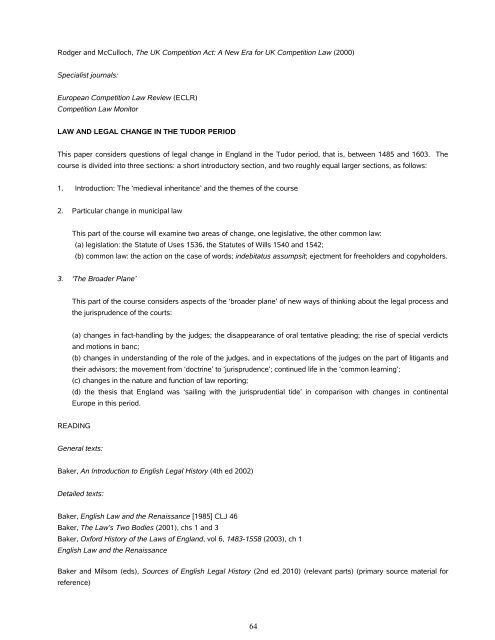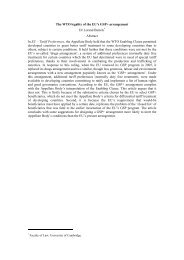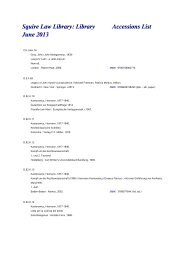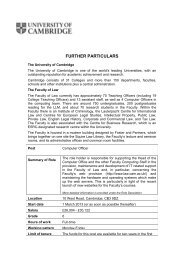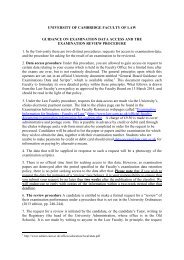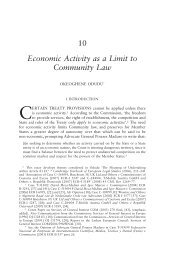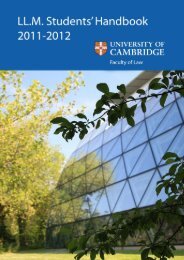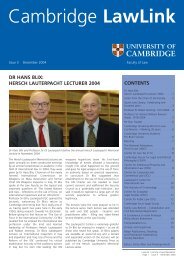Rodger and McCulloch, The UK Competition Act: A New Era for UK Competition <strong>Law</strong> (2000)Specialist journals:European Competition <strong>Law</strong> Review (ECLR)Competition <strong>Law</strong> MonitorLAW AND LEGAL CHANGE IN THE TUDOR PERIODThis paper considers questions <strong>of</strong> legal change in England in the Tudor period, that is, between 1485 and 1603. Thecourse is divided into three sections: a short introductory section, and two roughly equal larger sections, as follows:1. Introduction: The ‘medieval inheritance’ and the themes <strong>of</strong> the course2. Particular change in municipal lawThis part <strong>of</strong> the course will examine two areas <strong>of</strong> change, one legislative, the other common law:(a) legislation: the Statute <strong>of</strong> Uses 1536, the Statutes <strong>of</strong> Wills 1540 and 1542;(b) common law: the action on the case <strong>of</strong> words; indebitatus assumpsit; ejectment for freeholders and copyholders.3. ‘The Broader Plane’This part <strong>of</strong> the course considers aspects <strong>of</strong> the ‘broader plane’ <strong>of</strong> new ways <strong>of</strong> thinking about the legal process andthe jurisprudence <strong>of</strong> the courts:(a) changes in fact-handling by the judges; the disappearance <strong>of</strong> oral tentative pleading; the rise <strong>of</strong> special verdictsand motions in banc;(b) changes in understanding <strong>of</strong> the role <strong>of</strong> the judges, and in expectations <strong>of</strong> the judges on the part <strong>of</strong> litigants andtheir advisors; the movement from ‘doctrine’ to ‘jurisprudence’; continued life in the ‘common learning’;(c) changes in the nature and function <strong>of</strong> law reporting;(d) the thesis that England was ‘sailing with the jurisprudential tide’ in comparison with changes in continentalEurope in this period.READINGGeneral texts:Baker, An Introduction to English Legal History (4th ed 2002)Detailed texts:Baker, English <strong>Law</strong> and the Renaissance [1985] CLJ 46Baker, The <strong>Law</strong>’s Two Bodies (2001), chs 1 and 3Baker, Oxford History <strong>of</strong> the <strong>Law</strong>s <strong>of</strong> England, vol 6, 1483-1558 (2003), ch 1English <strong>Law</strong> and the RenaissanceBaker and Milsom (eds), Sources <strong>of</strong> English Legal History (2nd ed 2010) (relevant parts) (primary source material forreference)64
Further guidance on reading will be given during the course.LANDLORD AND TENANT LAW1. The history and politics <strong>of</strong> statutory regulation <strong>of</strong> the residential landlord-tenant relationship.2. The regulation <strong>of</strong> residential tenancies in the private and public sectors: in particular security <strong>of</strong> tenure and grounds forpossession, rent control and rent setting, and statutory succession. Lectures will cover both the existing law (Rent Act1977, Housing Act 1988 and Housing Act 1985) and the Rented Homes Bill.3. Civil and criminal liability for harassment and unlawful eviction <strong>of</strong> residential occupiers.4. Protection <strong>of</strong> business tenants: Landlord and Tenant Act 1954, Part II.5. Human rights in the landlord and tenant context.READING<strong>Law</strong> <strong>Faculty</strong>’s Statutes on Landlord and Tenant (2009-2010)Rented Homes Bill 2007 (and Explanatory Notes)Allen, Property and the Human Rights Act 1998 (2005)Arden, Carter and Dymond, Quiet Enjoyment: Remedies for Harassment, Illegal Eviction and Other Anti-social Behaviour(6th ed 2002)Bridge, Assured Tenancies (1999)Bright, Landlord and Tenant <strong>Law</strong> in Context (2007)Bright (ed), Landlord and Tenant <strong>Law</strong>: Past, Present and Future (2006)Cowan and McDermont, Regulating Social Housing (2006)Evans and Smith, The <strong>Law</strong> <strong>of</strong> Landlord and Tenant (6th ed 2002)Davey, Landlord and Tenant <strong>Law</strong> (1999)Hughes and Lowe, Public Sector Housing <strong>Law</strong> (3rd ed 2000)Hughes, Davis, Matthew and Jones, Text and Materials on Housing <strong>Law</strong> (2004)Madge and Sephton, Housing <strong>Law</strong> Casebook (4th ed 2008)Morgan, Aspects <strong>of</strong> Housing <strong>Law</strong> (2nd ed 2007)Rodgers, Housing <strong>Law</strong>: Residential Security and Enfranchisement (2002)Rook, Property <strong>Law</strong> and Human Rights (2001)Sparkes, A New Landlord and Tenant (2001)Wilkie, Luxton, Morgan and Cole, Landlord and Tenant <strong>Law</strong> (5th ed 2006)Reference:Arden and Hunter, Manual <strong>of</strong> Housing <strong>Law</strong> (8th ed 2007)Halsbury’s <strong>Law</strong>s <strong>of</strong> England (5th ed, vol. 27(1)), Landlord and TenantHill and Redman’s <strong>Law</strong> <strong>of</strong> Landlord and Tenant (loose-leaf), Division B: Business TenanciesReynolds and Clarke, Renewal <strong>of</strong> Business Tenancies (3rd ed 2007)Woodfall, Landlord and Tenant (loose-leaf), vol. 2, ch. 22: Business Tenancies65
- Page 2 and 3:
ContentsGeneral InformationOfficers
- Page 4 and 5:
Settlement of International Dispute
- Page 6 and 7:
Faculty AdministrationFaculty Offic
- Page 8 and 9:
The Faculty of LawLaw has been stud
- Page 10 and 11:
The LLM Degree. This degree is awar
- Page 12 and 13:
Opening Hours:Full Term: Monday to
- Page 14 and 15: Rules Made by the Information Strat
- Page 16 and 17: The Lauterpacht Centre for Internat
- Page 18 and 19: Centre for Corporate and Commercial
- Page 20 and 21: Cambridge Socio-Legal GroupThe Camb
- Page 26 and 27: Dates of Faculty Board Meetings7 Oc
- Page 28 and 29: Proceed with caution in reaching fo
- Page 30 and 31: Faculty CommunicationEach year, the
- Page 32 and 33: Law Tripos Part IA. A candidate for
- Page 34 and 35: Prizes. The following prizes may be
- Page 36 and 37: PAPER 2. CONSTITUTIONAL LAWA. The a
- Page 38 and 39: Oliver, Constitutional Reform (2003
- Page 40 and 41: Hedley, Tort (6th ed 2008)Weir, An
- Page 42 and 43: 3. Trusts and co-ownership: Concurr
- Page 44 and 45: Brownlie, Principles of Internation
- Page 46 and 47: Elliott, Constitutional Foundations
- Page 48 and 49: Contract: covenant and debt; assump
- Page 50 and 51: Statutes:Blackstone’s Statutes on
- Page 52 and 53: For reference:Birks and Pretto (ed)
- Page 54 and 55: Foster, EU Legislation (2010-2011)B
- Page 56 and 57: PAPER 42. INTELLECTUAL PROPERTY1. I
- Page 58 and 59: 2. Property torts (conversion and t
- Page 60 and 61: (iii)Causation4. Contracts in Engla
- Page 62 and 63: Rawls, Political LiberalismRawls, J
- Page 66 and 67: Law Commission, Renting Homes: The
- Page 68 and 69: Human Rights Case DigestHuman Right
- Page 70 and 71: 3. Title at common law and in equit
- Page 72 and 73: Exemption from Professional Examina
- Page 74 and 75: Paper application available to down
- Page 76 and 77: Form of Examination and Designation
- Page 78 and 79: ‘Open Book’ Papers. Where a pap
- Page 80 and 81: LLM : Syllabuses and Lists of Recom
- Page 82 and 83: ased upon one or two leading cases,
- Page 84 and 85: Goff and Jones, The Law of Restitut
- Page 86 and 87: Butterworths’ Company Law Handboo
- Page 88 and 89: 2. The EU’s system for human righ
- Page 90 and 91: the context of environmental protec
- Page 92 and 93: European Competition Law Review (EC
- Page 94 and 95: Crawford, The Treatment of Combatan
- Page 96 and 97: Douglas, The International Law of I
- Page 98 and 99: Unger, Free Trade Reimagined (2007)
- Page 100 and 101: 3. Sceptics and Critics I4. Sceptic
- Page 102 and 103: The course provides an opportunity
- Page 104 and 105: (iv)(v)(vi)(vii)Is either utilitari
- Page 106 and 107: Reiman, ‘Justice, Civilization, a
- Page 108 and 109: Gardner, Introduction to the Law of
- Page 110 and 111: 1. Types of theoretical analysis an
- Page 112 and 113: 2. Specific fieldsTopics to be sele
- Page 114 and 115:
The LLM (one-year taught postgradua
- Page 116 and 117:
As part of the requirements for the
- Page 118 and 119:
Teaching Members of the Faculty of
- Page 120 and 121:
MC Elliott, MA, PhD (Cantab); St Ca
- Page 122 and 123:
RA Melikan, BA (Mich), JD, MA (Chi)
- Page 124 and 125:
BD Sloan, MA, LLM (Cantab); King’
- Page 126 and 127:
Law Teachers in the Department of L
- Page 128 and 129:
Murray Edwards College. Dr S Turenn


